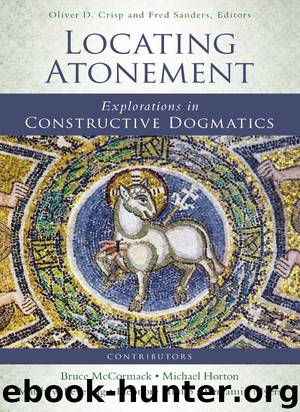Locating Atonement: Explorations In Constructive Dogmatics by Oliver D. Crisp & Fred Sanders

Author:Oliver D. Crisp & Fred Sanders
Language: eng
Format: epub
Tags: ebook
Publisher: Zondervan
Published: 2015-09-30T16:00:00+00:00
CHAPTER 7
ATONEMENT AND THE CONCEPT OF PUNISHMENT
DANIEL J. HILL AND JOSEPH JEDWAB
INTRODUCTION
In a broad sense, atonement refers to the state or condition of being at one or reconciled. In a narrower sense, it refers to the means by which such reconciliation is achieved. In Christian theology, this narrower sense of atonement refers to Christ’s sacrificial act by which such reconciliation between God and humans is achieved. Our sin creates an obstacle to right relationship with God. Christ’s sacrifice is (at least) part of the means whereby God removes this obstacle to such right relationship. There are, however, different theories as to how Christ’s sacrifice does this.
The penal-substitutionary theory of the atonement (PSA1) says that we deserve punishment for our sin, but instead of punishing us, God2 imposes a punishment on Christ for our sin. PSA finds its basis in a number of texts from the Bible. One is Isaiah 53:4 – 5:
Surely he took up our pain and bore our suffering, yet we considered him punished by God, stricken by him, and afflicted. But he was pierced for our transgressions, he was crushed for our iniquities; the punishment that brought us peace was on him, and by his wounds we are healed (NIV).
This text is picked up in the New Testament and explicitly applied to Christ in 1 Peter 2:24 (NIV):
“He himself bore our sins” in his body on the cross, so that we might die to sins and live for righteousness; “by his wounds you have been healed.”
Defenders of PSA have typically said that these texts teach that Christ’s sufferings and death on the cross were laid or imposed on him by God. God may have imposed them on Christ for many different reasons, but, according to the defender of PSA, one reason is penal in nature.
There are many different possible versions of PSA. One line of difference concerns whether Christ substitutes for a group (the church) collectively or for that group distributively, i.e., for each and every member of that group. Another line of difference concerns whether he substitutes (collectively or distributively) for a definite number of individuals, the view known as “definite atonement,” or whether he substitutes (again, collectively or distributively) for an indefinite number of individuals, the view known as “general atonement.” A further line of difference concerns whether Christ takes all the punishment due to those for whom he substitutes or only some of the punishment due to them. Yet another line of difference concerns whether those for whom Christ substitutes are said to be punished “in” Christ (or “in” his punishment), or not.
We shall not comment further on these differences, but now turn our attention to one final line of difference, whether Christ is punished by God or not. Here we find three views: what we shall call “the strong version,” that God did indeed punish Christ; “the weak version,” that God judicially imposed suffering (but in lieu of punishment, rather than as punishment) on Christ;3 and “the intermediate version,” that God imposed punishment on Christ, even though God did not punish Christ.
Download
This site does not store any files on its server. We only index and link to content provided by other sites. Please contact the content providers to delete copyright contents if any and email us, we'll remove relevant links or contents immediately.
The Secret Power of Speaking God's Word by Joyce Meyer(3154)
Signature in the Cell: DNA and the Evidence for Intelligent Design by Stephen C. Meyer(3123)
Real Sex by Lauren F. Winner(3002)
The Holy Spirit by Billy Graham(2938)
The Gnostic Gospels by Pagels Elaine(2516)
Jesus by Paul Johnson(2349)
Devil, The by Almond Philip C(2323)
23:27 by H. L. Roberts(2244)
The Nativity by Geza Vermes(2221)
Chosen by God by R. C. Sproul(2157)
All Things New by John Eldredge(2149)
Angels of God: The Bible, the Church and the Heavenly Hosts by Mike Aquilina(1950)
The Return of the Gods by Erich von Daniken(1925)
Angels by Billy Graham(1916)
Knowing God by J.I. Packer(1847)
Jesus of Nazareth by Joseph Ratzinger(1798)
The Gnostic Gospel of St. Thomas by Tau Malachi(1780)
How To Be Born Again by Billy Graham(1775)
Evidence of the Afterlife by Jeffrey Long(1773)
